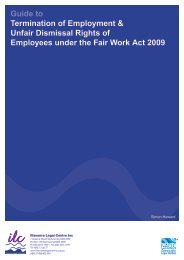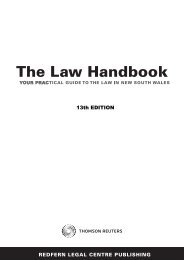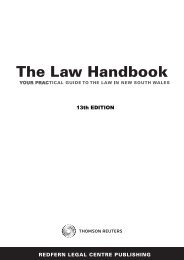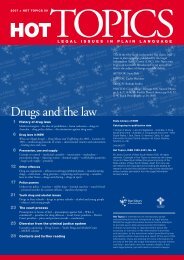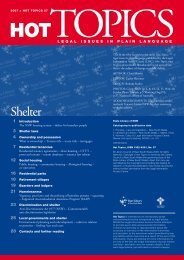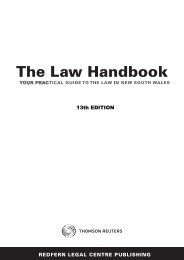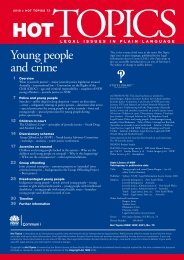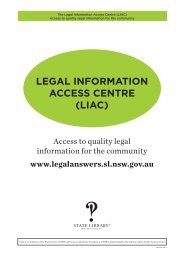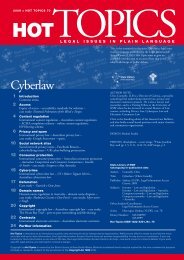Hot Topics 64 - Health and the Law - Legal Information Access Centre
Hot Topics 64 - Health and the Law - Legal Information Access Centre
Hot Topics 64 - Health and the Law - Legal Information Access Centre
Create successful ePaper yourself
Turn your PDF publications into a flip-book with our unique Google optimized e-Paper software.
End of<br />
life issues<br />
A major issue in this area is whe<strong>the</strong>r elderly people or<br />
those suffering a terminal illness can prepare directives<br />
specifying <strong>the</strong> point at which <strong>the</strong>y would like medical<br />
treatment not to be initiated or be withdrawn from<br />
<strong>the</strong>m.<br />
Such ‘living wills’ or ‘advance directives’ are rarely<br />
used even though <strong>the</strong>y are encouraged by <strong>the</strong> NSW<br />
Department of <strong>Health</strong>. 19 Part of <strong>the</strong> problem is that<br />
people find it very difficult to second guess what<br />
circumstances <strong>the</strong>y will be in <strong>and</strong> what medical treatment<br />
<strong>the</strong>y might need. An alternative worth considering is to<br />
include something like <strong>the</strong> following:<br />
‘I [name] DIRECT that medical treatment [which<br />
is not reasonably likely to return me to <strong>the</strong> following<br />
situation which I consider to be a minimum acceptable<br />
quality of life…..] be withheld or withdrawn.’<br />
This formulation gives treating doctors <strong>the</strong> very<br />
important information of what you would consider a<br />
minimal acceptable quality of life. They are <strong>the</strong>n in a<br />
much better position to judge what treatment will be in<br />
your best interests. No specific form is required for an<br />
advance directive in NSW, however some organisations<br />
have produced documents that can be used. 20<br />
These powers can also be conferred under health<br />
care powers of attorney <strong>and</strong> as a result of legal orders<br />
appointing a guardian over a person who is technically<br />
incompetent to make decisions about <strong>the</strong>ir own<br />
health care.<br />
VOlunTarY euTHanasia<br />
Voluntary euthanasia, ‘mercy killing’ or ‘assisted suicide’<br />
involves <strong>the</strong> deliberate killing of ano<strong>the</strong>r non-depressed<br />
human being at his or her request in order to reduce<br />
pain or assaults on human dignity related to a terminal<br />
illness. It has been rendered illegal by legislation in all<br />
states <strong>and</strong> territories in Australia.<br />
Euthanasia <strong>and</strong> assisted suicide is legal in <strong>the</strong> Ne<strong>the</strong>rl<strong>and</strong>s<br />
<strong>and</strong> Oregon in <strong>the</strong> US, <strong>and</strong> controversy continues about<br />
image u navailable<br />
Voluntary euthanasia supporter Dr Philip Nitschke,<br />
outside Central Local Court at <strong>the</strong> trial of Shirley Justins<br />
<strong>and</strong> Caren Jennings over <strong>the</strong> death of Graeme Wylie.<br />
They were convicted respectively of manslaughter <strong>and</strong><br />
of being an accessory to manslaughter in June 2008.<br />
Photo: Adam McLean, SMH.<br />
law reform in this area. Research suggests that many<br />
doctors assist terminally ill patients to die, but do not<br />
publicise <strong>the</strong> fact. In <strong>the</strong> Diane Pretty case <strong>the</strong> European<br />
Court of Human Rights held that <strong>the</strong> human right<br />
of respect for privacy was engaged where <strong>the</strong> State<br />
prevented a patient exercising her choice to avoid what<br />
he or she considered to be an undignified <strong>and</strong> distressing<br />
end to his or her life.<br />
It seems to be settled that doctors following a patient’s<br />
lawful direction to refuse life-saving medical treatment<br />
are not assisting suicide. 21<br />
palliaTiVe care: pain relief <strong>and</strong><br />
‘dOuBle effecT’<br />
In <strong>the</strong> case of Diane Pretty, Lord Bingham in <strong>the</strong><br />
House of Lords 22 considered that <strong>the</strong> human rights<br />
prohibition on ‘cruel, inhuman or degrading treatment’<br />
might be engaged where a public official had forbidden<br />
<strong>the</strong> provision of pain-killing or palliative drugs to a<br />
terminally-ill patient.<br />
19. Using Advance Care Directives; available online at http://www.health.nsw.gov.au/pubs/2004/pdf/adcare_directive.pdf; see details on p 23 for<br />
ordering free print copies.<br />
20. See for example <strong>the</strong> detailed form available from Hunter New Engl<strong>and</strong> Area <strong>Health</strong> Service<br />
http://www1.hnehealth.nsw.gov.au/docs/advanced_care_directive.pdf; <strong>and</strong> 4 page form in My <strong>Health</strong>, My Future, My Choice, see p 24 for details.<br />
21. See Re B (Adult: Refusal of Medical Treatment [2002] EWHC 429 (Fam); available at www.bailii.org/ew/cases/EWHC/Fam/2002/429.rtf<br />
22. [2001] UKHL 61, para 14; available at www.bailii.org/uk/cases/UKHL/2001/61.html<br />
End of life issues 13





